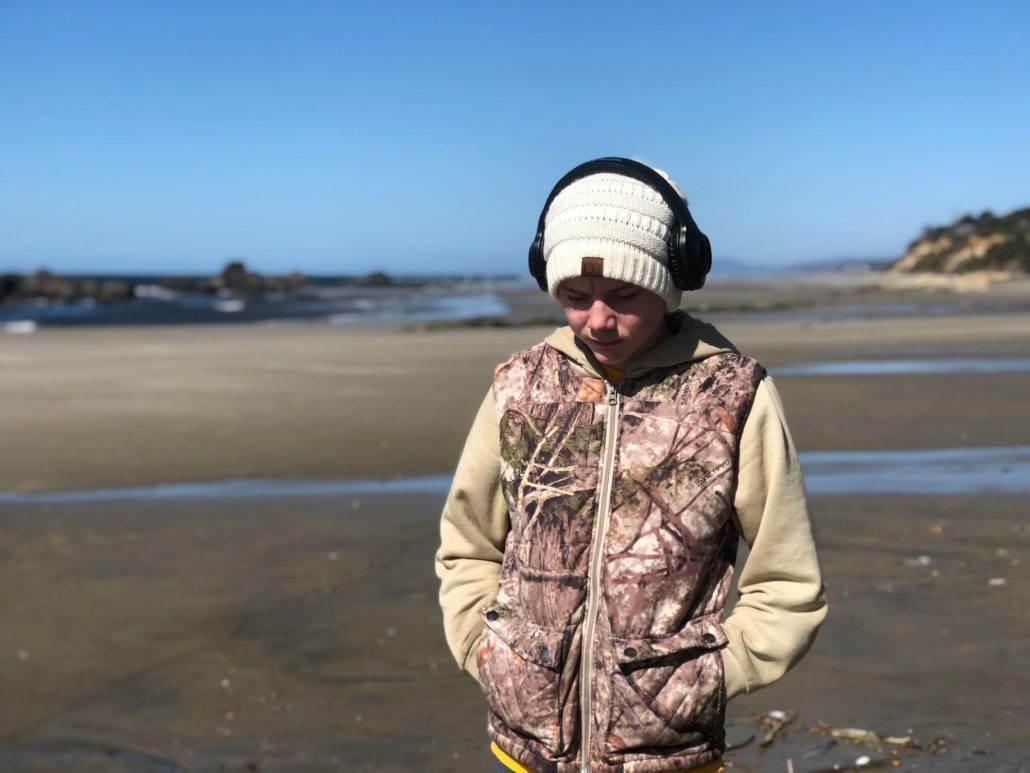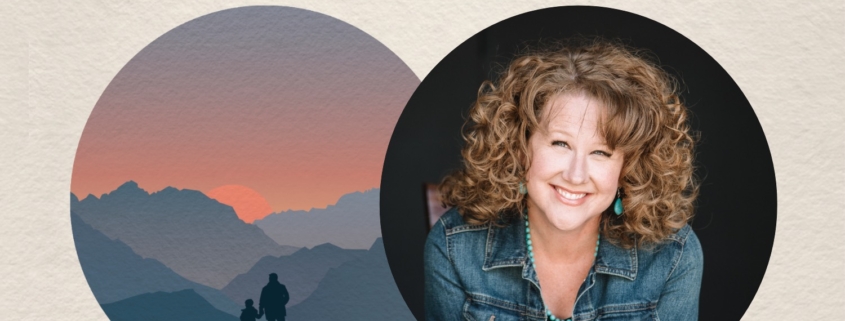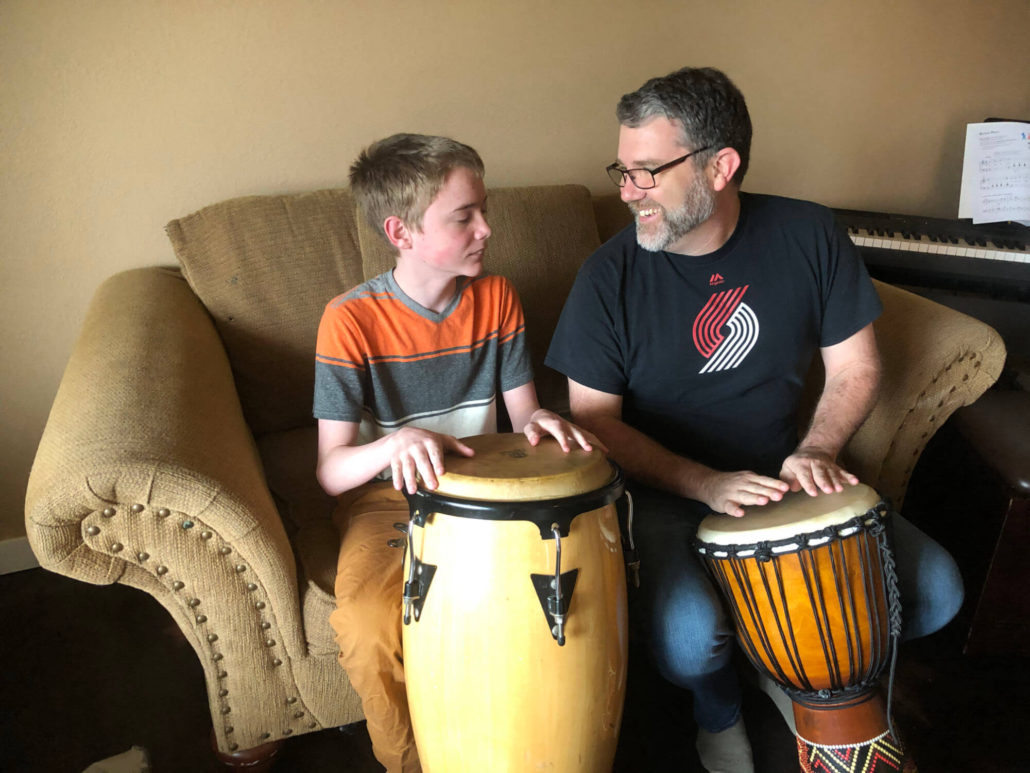Archive for month: April, 2020
The Night He Found His Drum: Thoughts on Autism and Inclusion
/2 Comments/by jasonThis is Jack. He’s fourteen years old, and loves watching movies and playing on devices. He has autism, anxiety, and obsessive compulsive disorder. Jack is functionally non-verbal. The words he does have are mostly clumped in memorized phrases, which he deploys at predictable times. His current phrase—and the most troublesome—is, “cover your ears.”
“Cover your ears” almost always comes in an urgent, high-pitched squeal. It often begins around four o’you-gotta-be-kidding-me in the morning. Practically speaking, he’s not talking about our ears, but about his own. The phrase means, “please for the love of everything good and holy, somebody plug some twisted up toilet paper in my ears, STAT!” (I know what you’re thinking… What a time to develop a T.P. habit! Pray for us…) We try to accommodate him as much as possible. We bought him washable earplugs, and we try to steer him toward his on-ear headphones, but neither satisfy him. His doctor can’t figure it out, and neither can we. Is this a sensory issue? A pressure thing? Or is he afraid of his ears popping? What’s going on?
This is our world. We are quarantined with mystery. It’s been that way for twelve years. Once in a while, Jack casually drops a piece of the puzzle onto the table for us, and it all makes sense. Those are days of great rejoicing. But those are also rare exceptions. And so far, he hasn’t been able to tell us why he so desperately needs to cover his ears, sometimes with multiple layers of protection. Those mysteries create separation.

Some weeks back, before the world started to stand on its head, we had some dear friends over for dinner. After we ate, kids and grown-ups gathered around guitars, pianos, and hand-drums to make memories. We’re not professional musicians, but we love to play, and to invite our kids to join in on the revelry. Of course, we never force Jack into evening hangouts, because he doesn’t want to come. He’s an introvert with covered ears. Besides, that’s his movie time. Sacred ground.
But something different happened that night that. My friend Corey started to play an original song on his acoustic, and Jack bolted in to the room wearing an expression I’ve only seen on him a handful other times. To call it a smile doesn’t quite cover it. This was a mega-wat wonder-gape; a wide-eyed rush of exhilarated joy. Imagine St. Peter’s expression on the day of transfiguration, and you’ll begin to see it. Jack’s entrance was so thunderous, we all turned to welcome him, but he only cared about Corey and his song. My boy took that beaming face of his and leaned in close to my friend, locking eyes with him. When they were twelve inches apart, Jack reached out and touched Corey’s beard affectionately.
I can’t explain it. Maybe he just liked the sound of the song. Or maybe he just liked the singer. Maybe he could sense that Corey’s gentleness—he’s a counselor after all, and who works every day with people on the spectrum.
Just throw it on the mystery pile, I guess. But here’s the best part: Jack didn’t merely like the song; no, he decided to join it. There was a conga drum sitting open, and he put it to good use. (That was when I grabbed my phone. The video is below. I was about ten seconds too late to catch the expression and the moment, but you can see him pounding away in earnest.) To our astonishment, he played with all of us the rest of the evening. We were elated.
The memory of that night makes me stop and consider the nature of inclusion—one of the highest values our community seeks to uphold. If inclusion means everyone has to play together, I think we miss it. I think we end up forcing people together who might prefer to watch their five-o’clock special alone in their favorite room.
But maybe inclusion is better seen as an open drum: an invitation to join in on the jam session. Maybe it’s an environment of openness without time restraints. If that’s the case, it becomes a little easier. Because I can’t presume to know what my son wants. He can’t tell me. I wish to God that he could. But if offer him a drum and the space to play his own rhythm when he’s ready, he might just take me up on it. He might get up and join the song.
Ever since that night, I have a new way to connect with my boy. We’ll pull out two congas and turn up Jack’s favorite movie soundtracks. We start with “Where No One Goes” from How To Train Your Dragon. It’s a fast song with pounding drums, and he likes to play fast until the drums cut out, and the flying music begins. When that happens, we stretch our arms out and glide like Toothless and Hiccup until the pounding resumes. It’s our new favorite thing.
He doesn’t always accept my invitation. Some days, he still prefers to “cover your ears.” But other days, the music gets through, like it did the night when Jack fell into Corey’s song. Can I share with you the words that set him spellbound?
“You Lord are tender. You’re beautiful and kind. Slow to anger rich in loveLook into my eyes, show me Your kindness again. I need Your strength to go onFor I’m Your child, I’m the creation of Your hands.There’s no one who can save me but YouI am crying out to You only for I know that You always hear meYou’re the one I can count on morning to night,And night back to morning.”
I won’t try to convince you that Jack understood all those words, and that’s why he reacted the way he did. You are free to draw your own conclusions. But I believe this with everything inside me: there is a melody that plays to all of us; a Godsong that beckons us into His living room. We can heed it or reject it, but most of us don’t have a problem believing that it might be for us.
But for those who haven’t had a place at the table—or a seat at the drum—that message can take a little convincing. It is for their sake, then, that we must move toward true inclusion. We must reiterate as plainly and as beautifully as we can: “You belong. You matter. You are a part of this sacred company. And we welcome you into this place, whenever you are ready.”
Special thanks to Corey Jackson, for the moment and for the lyrics to Morning to Night.
Archives
Search
Categories
Archive
- April 2023
- April 2022
- February 2022
- December 2021
- February 2021
- December 2020
- October 2020
- May 2020
- April 2020
- February 2020
- December 2019
- June 2019
- May 2019
- March 2019
- February 2019
- January 2019
- November 2018
- September 2018
- July 2018
- June 2018
- May 2018
- March 2018
- February 2018
- January 2018
- December 2017
- November 2017
- October 2017
- July 2017
- June 2017
- May 2017
- April 2017
- March 2017
- February 2017
- January 2017
- December 2016
- October 2016
- September 2016
- August 2016
- July 2016
- June 2016
- May 2016
- February 2016
- July 2015
- June 2015
- April 2015
- March 2015
- February 2015
- December 2014
- October 2014
- August 2014
- July 2014
- June 2014
- May 2014
- April 2014
- February 2014
- December 2013
- November 2013
- October 2013
- September 2013
- August 2013
- July 2013
- April 2013
- March 2013
- February 2013
- January 2013
- December 2012
- October 2012
- September 2012
- August 2012
- July 2012
- June 2012



